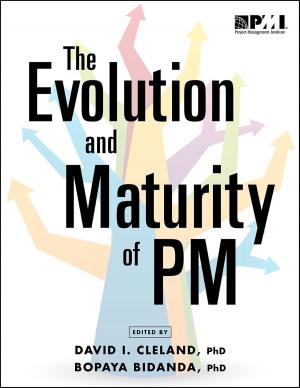Project Management Office (PMO)
A Quest for Understanding
Business & Finance, Management & Leadership, Management| Author: | Monique Aubry, PhD, MPM, Brian Hobbs | ISBN: | 9781628251364 |
| Publisher: | Project Management Institute | Publication: | April 1, 2010 |
| Imprint: | Project Management Institute | Language: | English |
| Author: | Monique Aubry, PhD, MPM, Brian Hobbs |
| ISBN: | 9781628251364 |
| Publisher: | Project Management Institute |
| Publication: | April 1, 2010 |
| Imprint: | Project Management Institute |
| Language: | English |
Since project management offices began to appear in organizations over the last decade, project management practitioners and their organizations have been asking how to structure project management offices (PMOs) and what functions to assign them. In The Project Management Office (PMO): A Quest For Understanding, authors Brian Hobbs and Monique Aubry address these questions, providing a look at how PMOs exist today, and some clues about how and why they're changing. Of particular interest to practitioners, the authors address the roles that PMOs play in organizations, which provides valuable insights for better creating, structuring and governing PMOs. When designing a PMO, an organization has a variety of choices regarding the PMO's structure and role assignment. By providing a way to define PMOs by type, this research explores how to set up and define a PMO, depending upon the specific type of PMO The authors discuss the many bases for the types of PMOs, including structural characteristics and functions, and how these types affect the PMO's role in the organization.
Since project management offices began to appear in organizations over the last decade, project management practitioners and their organizations have been asking how to structure project management offices (PMOs) and what functions to assign them. In The Project Management Office (PMO): A Quest For Understanding, authors Brian Hobbs and Monique Aubry address these questions, providing a look at how PMOs exist today, and some clues about how and why they're changing. Of particular interest to practitioners, the authors address the roles that PMOs play in organizations, which provides valuable insights for better creating, structuring and governing PMOs. When designing a PMO, an organization has a variety of choices regarding the PMO's structure and role assignment. By providing a way to define PMOs by type, this research explores how to set up and define a PMO, depending upon the specific type of PMO The authors discuss the many bases for the types of PMOs, including structural characteristics and functions, and how these types affect the PMO's role in the organization.















